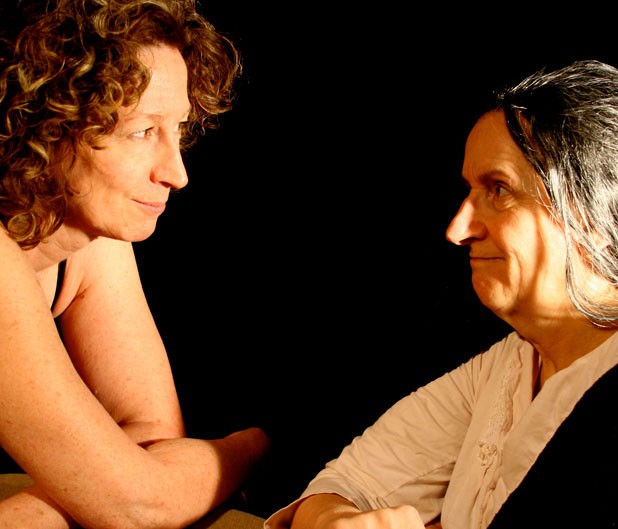
Mothers and daughters have complex, emotionally charged relationships even under the best circumstances. When their roles are reversed and an adult child becomes caregiver to an elderly parent, the potential for tension multiplies. In Martin McDonagh’s dark comedy The Beauty Queen of Leenane (1996), weary Maureen and her needy, constantly needling and wheedling mother Mag engage in a brutal battle of wills. “I see a lot of bleak and black in the world, but I also like to joke about it,” the Anglo-Irish playwright and screenwriter explained in a recent interview.
The dark duels deftly with the comedic in Champlain College’s current production of Beauty Queen at Burlington’s FlynnSpace. Director Joanne Farrell skillfully knits together a trio of seasoned local stage vets with a Champlain freshman making his Vermont debut. The tightly woven ensemble gives performances as textured, intricate and beautiful as Maureen’s Aran cardigan.
Mag Folan, 70, and her daughter Maureen, 40, live in west Ireland’s gorgeous County Galway, but their life together has turned petty and ugly. The Folan mother-daughter portrait has become the antithesis of a Hallmark card’s soft-focus photos and tender sentiments. Mag puts the aggressive in “passive-aggressive” with constant griping about lumpy porridge and sniping about Maureen’s personal life, or lack thereof. She runs her daughter ragged from the relative comfort of the kitchen’s fireside rocking chair.
Maureen describes to her mother, in rich detail, her dreams of Mag’s funeral. “I suppose now you’ll never be dying,” she says. “You’ll be hanging on forever, just to spite me.” Mag assures her that she’s right.
In fact, Maureen has put her own life on hold to care for her aging mom, a task Maureen’s sisters abdicated. She has never even had a boyfriend. But when Maureen brings home the sweet, sexy Pato Dooley after a party, sparks fly. Pato tells her that she is a beauty queen, the beauty queen of their village, Leenane. When Mag, to her shock, discovers Pato in the Folan kitchen the next morning, Maureen flaunts her conquest and newfound confidence in front of her flabbergasted mother.
Pato works in England, as many Irishmen do, but promises to write Maureen. The thought that the two may have made a genuine connection terrifies Mag. Her need to control her daughter’s life kicks into overdrive, with tragic consequences for all.
Ruth Wallman portrays the manipulative Mag brilliantly, with deadpan delivery of the callous digs at her daughter. Wallman’s face manifests the character’s shriveled, bitter soul. Mag sees the world through the narrow lens of what benefits Mag, and Wallman shows this with scrunched eyes, furrowed brow and pursed lips.
Kelly Thomas captures how emotional extremes transform Maureen’s physical appearance and carriage. She and Wallman spar artfully as daughter and mother, wringing every bit of comedic bite from McDonagh’s dialogue. When Mag’s relentless hectoring drains Maureen’s energy, Thomas’ face droops and her body sags. When Pato enters Maureen’s life, however, she glows under his influence. Thomas’ smile radiates her character’s sheepish anticipation, while her eyes flash and her cheeks flush with excitement.
Thomas and John D. Alexander, who plays Pato, generate touching romantic chemistry as two 40-year-olds surprised to find themselves suddenly in ... love? Lust? Suddenly in something unexpected and magical. Pato is a wonderfully drawn character, and Alexander’s nuanced performance brings out his deep compassion. Even when Mag and Maureen start to spin out of control, Alexander uses his sharp reflexes to show how the good-hearted Pato remains relaxed and understanding. For example, a quizzical expression quickly melts into a reassuring one.
Champlain freshman William Cook does a delightful turn as Ray Dooley, Pato’s little brother, who is tasked with bringing messages to the Folan household. In his scenes of crotchety banter with the unhelpful Mag, Cook’s body language conveys a teenager’s impatience and exasperation. He whips off thoughtless “fecks” as he stalks around the kitchen, shoulders sloped on his lanky frame.
The well-furnished kitchen set designed by Jim Lantz creates an appropriately worn mood for the play. Everything is slightly dated and mismatched. A stove, sink, fridge and shelves line the back wall; the front door stands to one side and the fireplace, with its smoke-blackened mantel, to the other. A pine kitchen table rests center stage, with Mag parked almost permanently in a rocking chair beside it. The pale green walls reflect the fatigue of the Folans’ world, as does the drab palette of costume designer Cora Fauser’s effective wardrobe choices.
The production’s one nagging flaw is the sound design, also credited to Lantz. Several scenes feature music or television audio in the background while characters are talking. On opening night, the volume was often so high that it was difficult to hear the dialogue clearly.
The Beauty Queen of Leenane was McDonagh’s debut as a dramatist, at the age of 26. He claims to have written it in only eight days. The play’s beauty is in its distillation of both the worst and the best of relationships: how cruelly Mag handles Maureen, how sweetly Pato treats her. This insight into character seems almost preternatural in a twentysomething scribe. Beauty Queen became an instant hit, launching McDonagh’s career on both sides of the Atlantic, and this production clearly shows why.









Comments
Comments are closed.
From 2014-2020, Seven Days allowed readers to comment on all stories posted on our website. While we've appreciated the suggestions and insights, right now Seven Days is prioritizing our core mission — producing high-quality, responsible local journalism — over moderating online debates between readers.
To criticize, correct or praise our reporting, please send us a letter to the editor or send us a tip. We’ll check it out and report the results.
Online comments may return when we have better tech tools for managing them. Thanks for reading.